Hi,
I'd like to ask what the thoughts behind the bonuses are on pound lock canals, while they are no doubt one of the more important infrastructure developments in history it feels like their bonuses are a little unusual for what they do. Why has Tinto set them to be distance cost to capital (control increase) and food production?
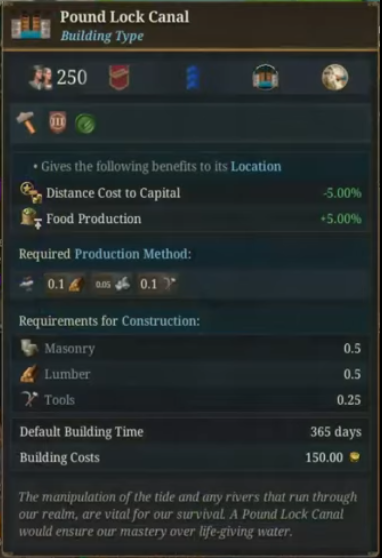
What is a pound lock canal; its essentially a large body of water to move things about, typically either by physical pulling of the goods by rope by a human, (horses were a fairly late addition to canals in most places), basic sail rigs or oars. They are typically between from 5-30m wide, and anything from 1-3m deep. They need to be filled from a significant water source able to supply and sometimes top up the canals at various points down the network, especially when there's large numbers of locks, either a river or a spring. They also need relatively flat land to operate, you can make them in mountains but the cost is hugely increased.
To maintain a canal you need to maintain that water source, you need to be able to prop up the banks, often with wicker barriers, clay (or sometimes later on using stone/brick) to line the canal maintaining the water levels as well as the various mechanisms to keep a stable water level, sluice gates and the pound lock systems. (using iron, wood and in some cases very simple mechanisms), the most important part of maintaining the canal is a level of manpower to stop them filling with debris and rotted plant matter. Later this was expanded to also maintain a path for humans and horses.
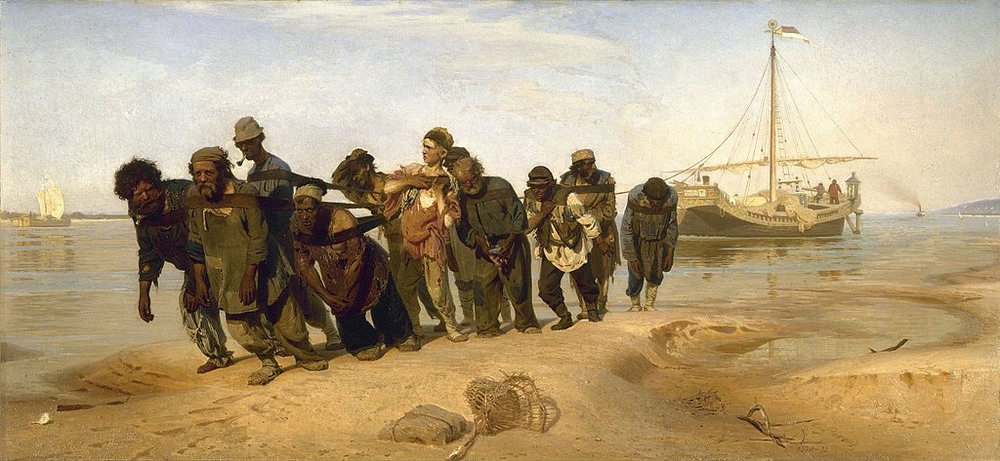
What is the point of a canal; simply put its to move goods, especially heavy non perishables like building material. They allow large packets of goods to move efficiently and incredibly slowly to a delivery point. They can be used for perishables but the moist method of transport can make this costly or more complex than moving over land with higher spoilage. Canals can also be used to provide defenses to an area or as the dutch famously used to flood lowland areas to deny enemy movements, and in some but not all cases they can also be used to help provide irrigation depending on the viability of the water source used. One of the other benefits of canals is you can easily track movements of goods and when they are expected to be delivered by logging where the various cargo meets certain points, with large projects using a network similar to the postal systems logging which traffic and goods would then be logged at certain points of the journey and ridden to delivery points (in some cases this was also useful for customs and dutues).
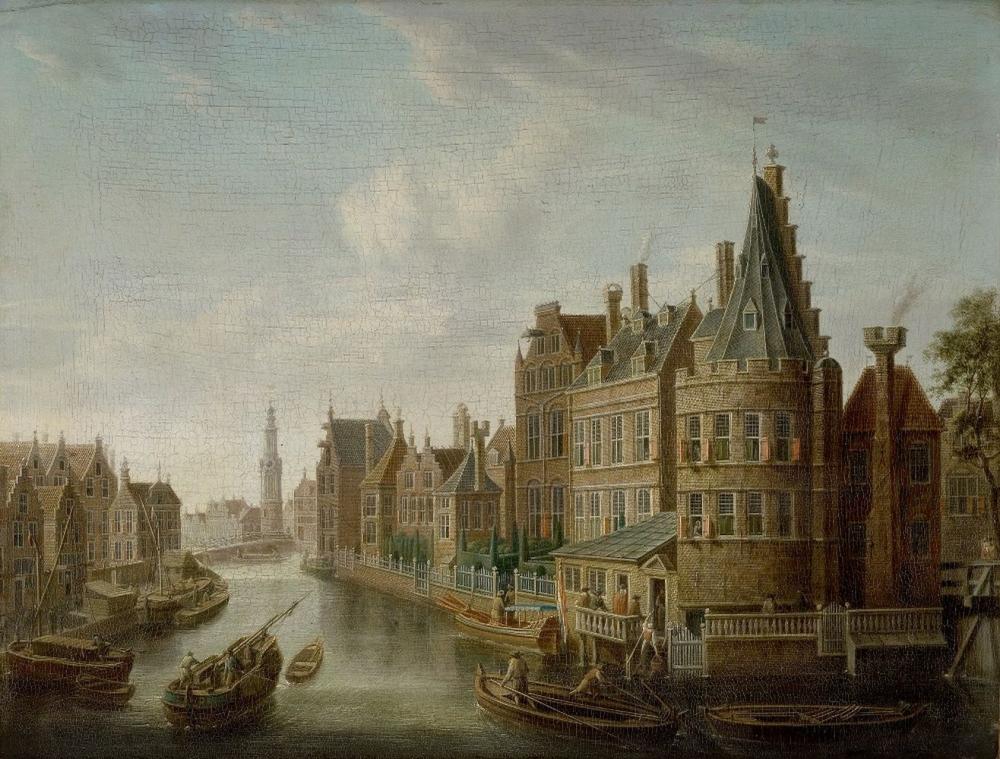
So why the question?
The canal does not reduce "distance to capital", if anything the canal extends and elongates distance to capital, due to the way they function they both elongate routes to bridging points but more importantly goods move on canals incredibly slowly, much slower than on a road system, they are also nearly always more indirect between point A and B due to the need to wind around flat areas. The benefit of the canal is it is incredibly cheap and reletively safe to move large amounts of heavy material over long distances so while it takes longer to move the goods you can move more of them, slowly, but they will arrive with a lower manpower cost.
I also admit from a personal level, the idea of running a canal through korea (inspired by generalist gaming) or another body of land absolutely horrifies me as it simply wouldn't improve communication methods. I don't really see a sensible way to argue that things arrive quicker on a canal, due to armies walking the things and more importantly communication between capitals and local centres of government using dispatch riders being a hugely superior method of interacting.
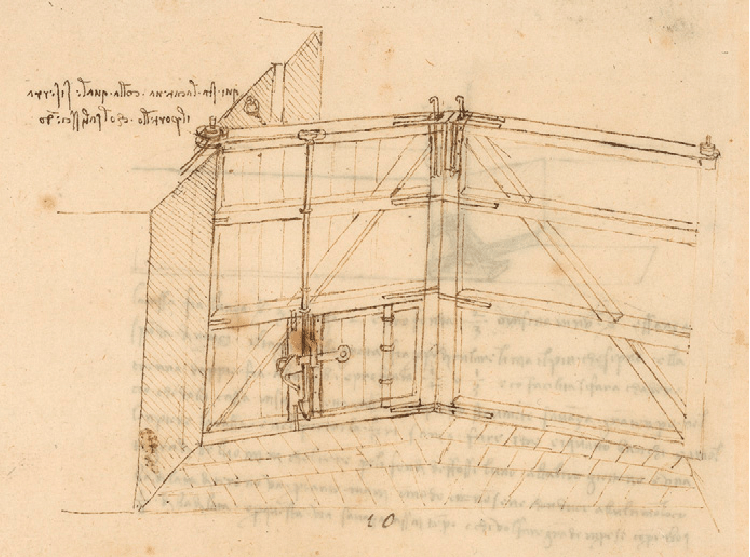
So what should a canal do in EU5?
I don't really have a definite answer for this, as someone who's keen to play and has been following the game. The food bonus is kind of fine but the water was typically very dirty due to the way boats were made that created a number of pollutants that weren't great for farmland or wildlife inside them which isn't really thought about in the modern world now canals are usually beautiful wildlife corridors. It could also have some kind of bonus to coal/stone etc? I'd also be concerned that the whole point of canals is to move things from far away cheaply to something that needs it, similar to victoria's price market access mechanic.
I'm open to ideas but ultimately they should be a trade improvement based on something slow but increasing access or lowering cost without the huge benefit to control and unusual meta around it that is easily attributable to road systems and not canals!
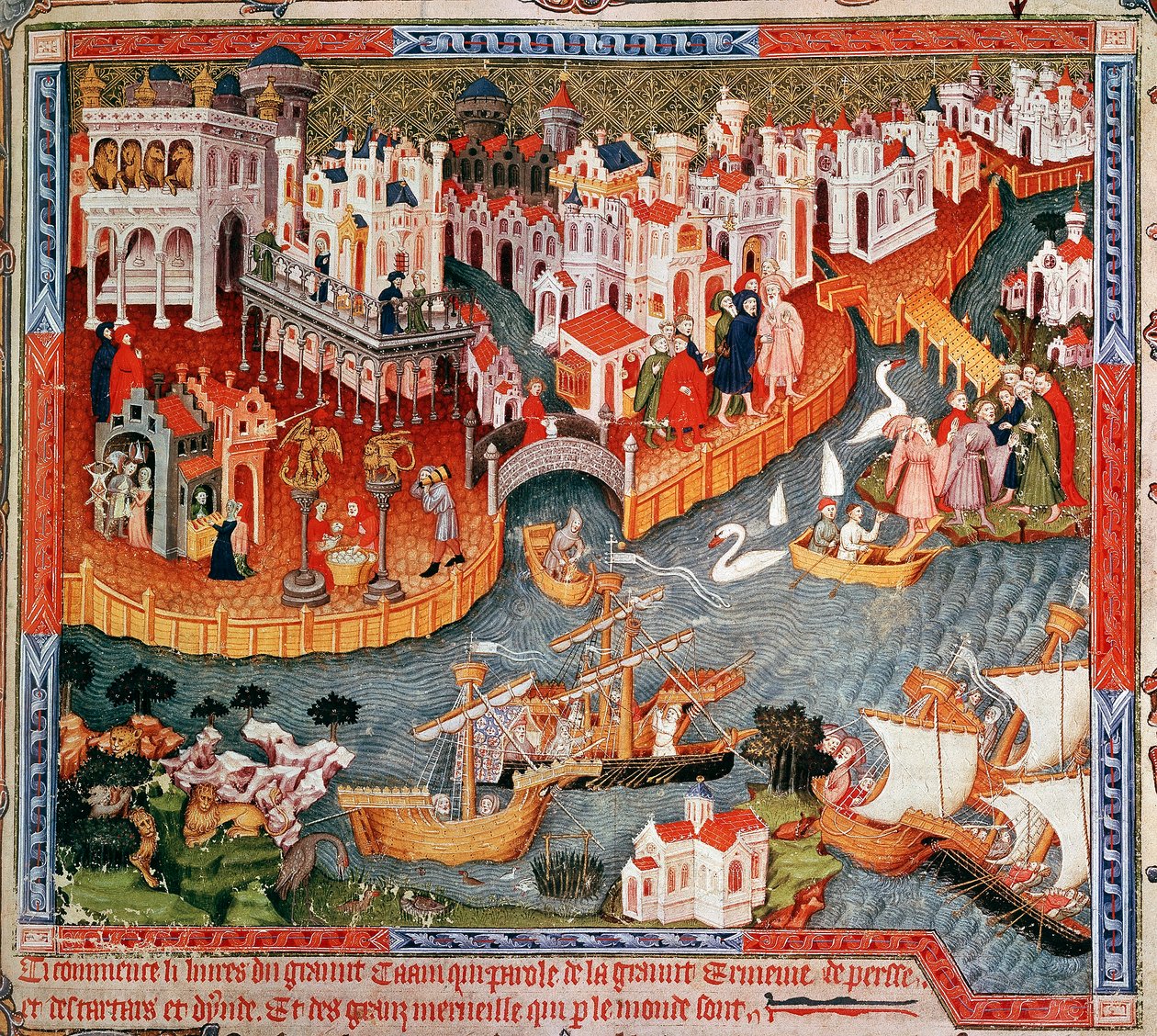
Thank you for reading, the pictures are mostly just to make it pretty
I'd like to ask what the thoughts behind the bonuses are on pound lock canals, while they are no doubt one of the more important infrastructure developments in history it feels like their bonuses are a little unusual for what they do. Why has Tinto set them to be distance cost to capital (control increase) and food production?

What is a pound lock canal; its essentially a large body of water to move things about, typically either by physical pulling of the goods by rope by a human, (horses were a fairly late addition to canals in most places), basic sail rigs or oars. They are typically between from 5-30m wide, and anything from 1-3m deep. They need to be filled from a significant water source able to supply and sometimes top up the canals at various points down the network, especially when there's large numbers of locks, either a river or a spring. They also need relatively flat land to operate, you can make them in mountains but the cost is hugely increased.
To maintain a canal you need to maintain that water source, you need to be able to prop up the banks, often with wicker barriers, clay (or sometimes later on using stone/brick) to line the canal maintaining the water levels as well as the various mechanisms to keep a stable water level, sluice gates and the pound lock systems. (using iron, wood and in some cases very simple mechanisms), the most important part of maintaining the canal is a level of manpower to stop them filling with debris and rotted plant matter. Later this was expanded to also maintain a path for humans and horses.

What is the point of a canal; simply put its to move goods, especially heavy non perishables like building material. They allow large packets of goods to move efficiently and incredibly slowly to a delivery point. They can be used for perishables but the moist method of transport can make this costly or more complex than moving over land with higher spoilage. Canals can also be used to provide defenses to an area or as the dutch famously used to flood lowland areas to deny enemy movements, and in some but not all cases they can also be used to help provide irrigation depending on the viability of the water source used. One of the other benefits of canals is you can easily track movements of goods and when they are expected to be delivered by logging where the various cargo meets certain points, with large projects using a network similar to the postal systems logging which traffic and goods would then be logged at certain points of the journey and ridden to delivery points (in some cases this was also useful for customs and dutues).

So why the question?
The canal does not reduce "distance to capital", if anything the canal extends and elongates distance to capital, due to the way they function they both elongate routes to bridging points but more importantly goods move on canals incredibly slowly, much slower than on a road system, they are also nearly always more indirect between point A and B due to the need to wind around flat areas. The benefit of the canal is it is incredibly cheap and reletively safe to move large amounts of heavy material over long distances so while it takes longer to move the goods you can move more of them, slowly, but they will arrive with a lower manpower cost.
I also admit from a personal level, the idea of running a canal through korea (inspired by generalist gaming) or another body of land absolutely horrifies me as it simply wouldn't improve communication methods. I don't really see a sensible way to argue that things arrive quicker on a canal, due to armies walking the things and more importantly communication between capitals and local centres of government using dispatch riders being a hugely superior method of interacting.

So what should a canal do in EU5?
I don't really have a definite answer for this, as someone who's keen to play and has been following the game. The food bonus is kind of fine but the water was typically very dirty due to the way boats were made that created a number of pollutants that weren't great for farmland or wildlife inside them which isn't really thought about in the modern world now canals are usually beautiful wildlife corridors. It could also have some kind of bonus to coal/stone etc? I'd also be concerned that the whole point of canals is to move things from far away cheaply to something that needs it, similar to victoria's price market access mechanic.
I'm open to ideas but ultimately they should be a trade improvement based on something slow but increasing access or lowering cost without the huge benefit to control and unusual meta around it that is easily attributable to road systems and not canals!

Thank you for reading, the pictures are mostly just to make it pretty
- 3
- 1
- 1
- 1

